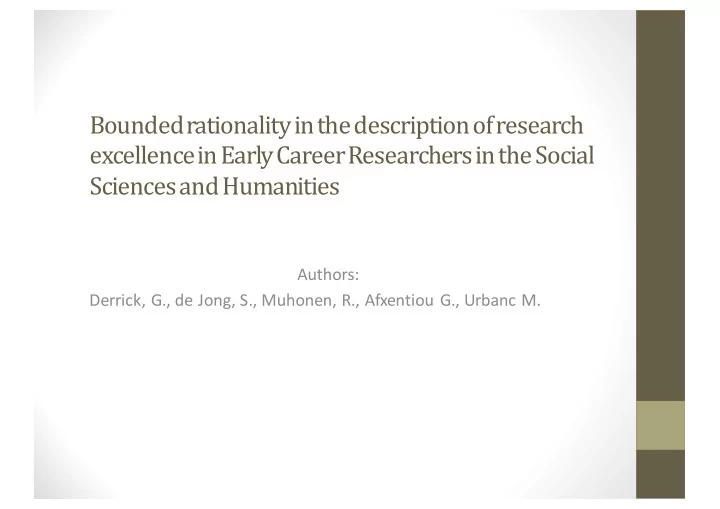

Bounded rationality in the description of research excellence in Early Career Researchers in the Social Sciences and Humanities Authors: Derrick, G., de Jong, S., Muhonen, R., Afxentiou G., Urbanc M.
ECRs Evaluation System Introduction Sunstein and Thaler recommend that choice architectures are modified in light of human agents' bounded rationality. Bounded rationality is the idea that when individuals make decisions, their rationality is limited by the tractability of the decision problem, the cognitive limitations of their minds, and the time available to make the decision. Decision-makers in this view act as satisficers, seeking a satisfactory solution rather than an optimal one.
ECRs Evaluation System Statement of the problem It examines how ECRs in the Social Science and Humanities resolve their identity as academics in light of the growing audit culture in department, universities and disciplines, with a particular focus on the social re-construction of societal excellence in academia.
ECRs Evaluation System Research aim The study addresses the dilemma of bounded rationality, that sees current audit culture as a strong academic governance influence on individual ECR decision-making. Research objectives 1. To analyse the evaluation experiences of ECRs in career advancement and grant competitions. 2. To make a contribution to the development of an evaluation system for researchers throughout the academic institutions. Research Question What kind of experiences do they have on research evaluation practices and their relationship to the career development?
ECRs Evaluation System Design/Methodology/Approach This paper uses interviews with 70 Early Career Researchers to explore how their research ambitions and descriptions of their current level of research excellence. Grounded theory and data analysis will support the theme development of this research. • Semistructured interview questions • Completion of an interview session is between sixty to ninety minutes • Data analysis is conducted with Nvivo software • Interviews are given to ECRs in participating countries (ENRESSH) • Interviews had been concluded in 2018
Classification of National Evaluation Contexts Strong/weak evaluation systems – strong is when the system directly links performance with funding allocation, and weak is when there is no connection to funding outcomes. Weak (no formal evaluation) – Medium (no strong formalised research performance system) – Strong (formalised research performance systems) Choice to engage in formalised evaluation processes – assessed as an individual etc.
Classification of National Evaluation Contexts Formalised institutional evaluation – no choice but to conform to the REF Formal evaluation – Formal evaluation – choice-led – ex-ante – choice-led- ex-ante – research space research space Tacit Tacit Tacit Field-specific Field-specific Field-specific Note: This is to be cross referenced with WP1 data
ECRs Evaluation System Questions and Comments
Recommend
More recommend